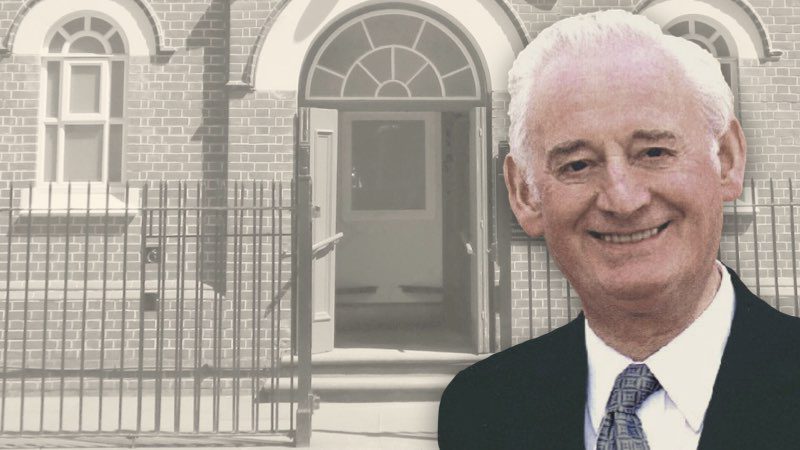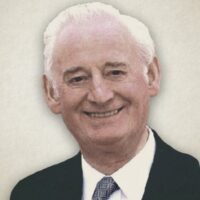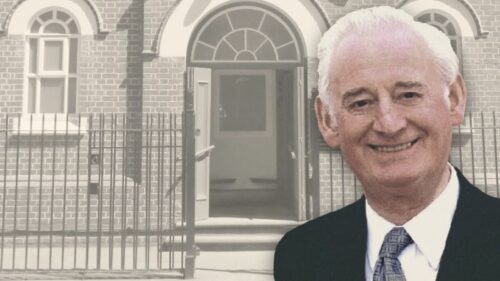
“Even unto Bethlehem”
[Posted by permission. Bethel Strict Baptist Chapel.]
Sermon preached at Bethel Chapel, Luton, by Mr. B.A. Ramsbottom, on Lord’s day morning, 25th December, 2022
“Let us now go even unto Bethlehem”—Luke 2:15
This was the most amazing happening since the creation of the world. None can really understand it. “Without controversy, great is the mystery of godliness, God was manifest in the flesh” – that He who from everlasting was equal with His Father, true almighty God, should veil His glory, come to this dark, sinful world, be born of a virgin, a human mother, a real birth, a true humanity, no earthly father. We cannot understand it, but we bow and we worship and adore. What does it all mean? What was the purpose of it? “When the fulness of the time was come, God sent forth His Son, made of a woman, made under the law, to redeem them that were under the law.” The purpose of His coming: the great work of redemption. There was no necessity for Him to leave heaven for earth, enjoying that sacred union with His beloved Father and the Holy Spirit.
“But love to sinners moved His heart,
And made Him choose to die.”
O the wonder of it! May we truly bow our heads this morning and worship our glorious Immanuel, the Lord Jesus, God with us.
Now no doubt you must have noticed in holy Scripture a special welcome seems to be given to the mention of the little town of Bethlehem. We have it again and again. The first time, where Jacob’s beloved Rachel died, and where he buried her, a place of sorrow. And then the place where Ruth came gleaning in the fields of Boaz. And then the knowledge that David was born at Bethlehem. Little by little the Saviour’s coming was revealed: first of all a descendent of Abraham, and then that He should be a Son of David, and a few hints here and there, and then at last, as we read this morning (Micah 5. 1-5), the place itself was identified: Bethlehem. “Thou, Bethlehem Ephratah, though thou be little among the thousands of Judah, yet out of thee shall He come forth unto Me that is to be Ruler in Israel; whose goings forth have been from of old, from everlasting.”
When holy Scripture in the Old Testament concludes, there was a waiting time of four hundred years, and what happened to that little town of Bethlehem? It seems there were days of darkness, days of sorrow, but the Lord’s ancient people lovingly, prayerfully waited. They knew that the time would come when the almighty Saviour of sinners, the Son of God, should come and should be born in Bethlehem.
These words I have read to you this morning were the language of the shepherds. “Let us now go even unto Bethlehem.” We do not know much about these shepherds – how many there were, whether they were young or old. It seems they were among that little remnant who were waiting for the consolation of Israel, and they were not disappointed, but it came suddenly. It is no wonder it was a shock to them. It is no wonder that they were all sore afraid. But they had angels descending from heaven to give them this glorious tiding: “Fear not: for, behold, I bring you good tidings of great joy.” That is another word for the gospel: “good tidings of great joy…. For unto you” – you poor shepherds, and the little remnant of believing souls and God’s unworthy people to the end of time – “Unto you is born this day in the city of David a Saviour, which is Christ the Lord.”
Have you ever noticed this: when the prophet beautifully prophesied of the coming of the Lord Jesus, what did he say? “Unto us a Child is born, unto us a Son is given”? Now the angels could not say that. Favoured beings as they are, it was not to save them that the Lord Jesus came. But with what affection these angels spoke it: “Unto you.” “Unto you is born this day in the city of David a Saviour which is Christ the Lord.” The great, the mighty, the famous were passed by, and it was to a few poor shepherds that this glorious tiding was first proclaimed. It is no wonder they said, “Let us now go even unto Bethlehem,” and there is a now here. There is an urgency in real religion, beloved friends. “Let us now go even unto Bethlehem.” We are told that they came with haste. And what a discovery! “Mary, and Joseph, and the Babe lying in a manger.” I believe those shepherds worshipped Him as true, almighty God, and that must be surely the highest act of faith, when you can go to Bethlehem and there see a helpless Child lying in a manger in poverty, and you can worship Him as true, almighty God, your only hope.
“No less almighty at His birth,
Than on His throne supreme.”
They were blessed with living faith, and they were blessed with the sweet constrainings of love, and they could not rest satisfied till they found Him.
What about the poor sheep? Well, I believe these were good, caring shepherds, but they had something more important now. They had to leave their few sheep in the wilderness and as one of the old divines put it so sweetly, they left their sheep and they came to behold the Lamb of God.
“Let us now go even unto Bethlehem.” Now that was the shepherds, but if you consider it lovingly and prayerfully, it was not just the shepherds who came to Bethlehem. We have mentioned the angels, and they in spirit said, “Let us now go to Bethlehem,” in loving obedience to their God and Master, with infinite delight. O that visit of the angels! “Glory to God in the highest, and on earth peace, good will toward men.” There are some mysteries about angels, many things we do not understand, but we do know this: their sacred delight was always to obey their Lord and Master and to do His will. What an example they are to us! They must have been amazed at the happenings. But with what sacred delight they came to sing of the Lord of glory who had come from above.
“Suddenly there was with the angel a multitude of the heavenly host praising God, and saying, Glory to God in the highest, and on earth peace, good will toward men.” There are three simple things there: the first, the glory of God; the second, peace. O this was the Prince of Peace, and He had come to make peace by the blood of His cross, and He had come that He might give that peace.
Then the third thing – it is so corrupted today; people do not understand it – “Good will toward men.” People talk about this: it is the season of good will, when people should be nice one to another. Well, it is a good thing when people are nice to one another at this time, but “good will toward men” – this is what we read of in the Book of Exodus: “The good will of Him that dwelt in the bush” – the everlasting purpose of love and mercy to unworthy sinners, the good will of Father, Son and Holy Ghost towards them. “Glory to God in the highest, and on earth peace, good will toward men.”
“Let us now go even unto Bethlehem.” So the angels came to Bethlehem, but never forget, Joseph and Mary came to Bethlehem. I am not sure whether they came with such gladness and joy and happiness as the holy angels. There was to be this census, this enrolling, that the people might be taxed. It could not have come at a more difficult time for Joseph and Mary – the expected Child just about to be born; they did not know how soon. Never forget, this was according to “the determinate counsel and foreknowledge of God.” “There went out a decree from Cæsar Augustus, that all the world should be taxed.” He was an ungodly man. He was the mightiest king upon earth. He was doing it just to satisfy his own desires. And yet in the purpose of God, that time had come, that moment had come, when the Saviour of sinners should be born, and it must be at Bethlehem. It could not be anywhere else.
Joseph and Mary did not live in Bethlehem. They lived in Nazareth. Perhaps they themselves wondered why they had to go that difficult, arduous journey, so difficult for Mary at such a time as this. But divine appointments must be kept, and if no-one else will make sure that they will be kept, then Almighty God will move the mightiest ruler in the world to issue a decree, “that all the world should be taxed,” and they had to go up to their own city. Joseph and Mary were both descended from David, so their ancestry was Bethlehem. “And Joseph also went up from Galilee, out of the city of Nazareth, into Judæa, unto the city of David.” There is that emphasis there: it was “the city of David, which is called Bethlehem; (because he was of the house and lineage of David).”
“Let us now go even unto Bethlehem.” Of course, all of you know who else felt impelled to come to Bethlehem: the wise men. How did they know about Bethlehem? Well, at first they were mistaken. They thought if this is the King of the Jews, it must be Jerusalem. But it seems that all the wise people in Jerusalem knew the Scripture so well that the holy Babe must be born at Bethlehem, the city of David. They quoted Scripture. They were so clear on it. But we do not read that a single one showed any interest. That is the darkness, the unbelief of sinners by nature.
It was the same love which drew the shepherds, which drew the wise men. We do not know who they were, what they were, where they came from, how many there were. Roman Catholic tradition will tell you all kinds of things. It will tell you what their names were; it will tell you the city where they are all now buried, and so on, but these things are wisely hidden. They came with one desire: to be true worshippers. When they actually found a poor man and a poor woman and a helpless Child, well this was faith: they worshipped Him.
It is beautiful, those gifts that they brought: gold, frankincense and myrrh. They have always been given a typical meaning by the people of God. Gold, because He was a King. He was the One born King of the Jews. And frankincense. It is only offered in worship. Frankincense, because He is God. And then a strange gift: myrrh. Myrrh, connected with suffering, connected with death, symbolising the Saviour’s atoning love and blood. “When they were come into the house, they … fell down, and worshipped Him.”
Well, not only the shepherds, but really there were these three other cases of those who were led to go even to Bethlehem, to worship their incarnate God. O but the point I must come to surely is the vital one for you and me this morning: “Let us now go even unto Bethlehem,” not just these saints of old. What about us? There are many here this morning who have been blessed by the Spirit of God, raised up to a living hope in the Lord Jesus, brought to know Him as their Saviour and their God, and surely at this time of the year, this should be our desire: Let us also go up to Bethlehem.
Now of course, especially thinking of our children, what does it mean for us in Bethel Chapel this morning to go to Bethlehem? It does not mean that we should be seeking to travel to the Holy Land when Christmas day comes. There are quite a few in this chapel this morning who have been to Bethlehem, but how easily you can be favoured to go to Bethlehem, you are interested, it is remarkable to you. O but may we be led to go to Bethlehem, not bodily, but in our spirit. I thought the well-known hymn we began the service with explains it so clearly:
“Let us with humble hearts repair” – now this is it: (Faith will point out the road)
To little Bethlehem, and there Adore our infant God.”
It is going to Bethlehem this morning in our thoughts, in true worship, constrained by the Saviour’s love, seeking that He might be glorified today, desiring the honour and glory of His name amongst us. Well, that is a good prayer for you when you go home: that you might be blessed with living faith to go forth in your thoughts, in your meditation, in your affection, and may you be sweetly favoured, beloved friends – some of you, a few of you, many of you – to be led by the Spirit even to the place called Bethlehem, and there to “worship your incarnate God, and know He saved you by His blood.”
I think in many ways this is the most important part of the text. It is interesting to think about the wise men, the angels and so on, all the ones we have mentioned. O but what about us in this sad, solemn, latter day, in all our sinfulness? The great point is we need what happened at Bethlehem, we need that dear, almighty Saviour who was born at Bethlehem. May we not be disappointed.
I have often told you over the years, I think I only had one really special Christmas day, many years ago when I was preaching at Willenhall, and they sang,
“He left His radiant throne on high!
Left the bright realms of bliss!
And came to earth to bleed and die!
Was ever love like this?”
Then I believe in spirit I really did visit Bethlehem that day. “For ye know the grace of our Lord Jesus Christ, that, though He was rich, yet for your sakes He became poor, that ye through His poverty might be rich.”
“Let us now go even unto Bethlehem.” Just one last thought. It is wonderful sweetly to be enabled with a few precious thoughts in worship to go to Bethlehem, but never forget the Lord Jesus is not at Bethlehem now. Blessed be His name, He came to Bethlehem, but we have to go beyond Bethlehem to Calvary, a dear, dying Saviour, to His burial, to the empty tomb. But He is no longer at Calvary; He is no longer in the grave. O where is He? “This same Jesus,” this dear, almighty, living Saviour, exalted at God’s right hand, “a Prince and a Saviour, for to give repentance to Israel, and forgiveness of sins.” O that is where He is this morning. May we be blessed with living faith to look to Jesus, once crucified, now exalted, for ever glorified. “But this Man, because He continueth ever, hath an unchangeable priesthood. Wherefore He is able also to save them to the uttermost that come unto God by Him, seeing He ever liveth to make intercession for them.”
“Let us now go even unto Bethlehem.”
While heavenly hosts their anthems sing,
In realms above the sky,
Let worms of earth their tribute bring,
And laud the Lord most high.
In thankful notes your voices raise,
Ye ransomed of the Lord;
And sing the eternal Father’s praise,
The God by all adored.
All creatures to His bounty owe
Their being and their breath;
But greatest gratitude should flow
In men redeemed from death.
His only Son He deigned to give;
What love this gift declares!
And all that in the Son believe,
Eternal life is theirs.
J. Hart
Come, ye redeemèd of the Lord,
Your grateful tribute bring;
And celebrate, with one accord,
The birthday of our King.
Let us with humble hearts repair
(Faith will point out the road)
To little Bethlehem, and there
Adore our infant God.
In swaddling bands the Saviour view!
Let none His weakness scorn;
The feeblest heart shall hell subdue,
Where Jesus Christ is born.
No pomp adorns, no sweets perfume
The place where Christ is laid;
A stable serves Him for His room,
A manger is His bed.
The crowded inn, like sinners’ hearts,
(O ignorance extreme!)
For other guests, of various sorts,
Had room; but none for Him.
But see what different thoughts arise
In our and angels’ breasts;
To hail His birth they left the skies,
We lodged Him with the beasts!
Yet let believers cease their fears,
Nor envy heavenly powers;
If sinless innocence be theirs,
Redemption all is ours.
J. Hart
Benjamin Ramsbottom (1929-2023) was a Strict and Particular Baptist preacher. In 1967, he was appointed pastor of the church meeting at Bethel Strict Baptist Church, Luton, Bedfordshire, a position he held for fifty-five years.




